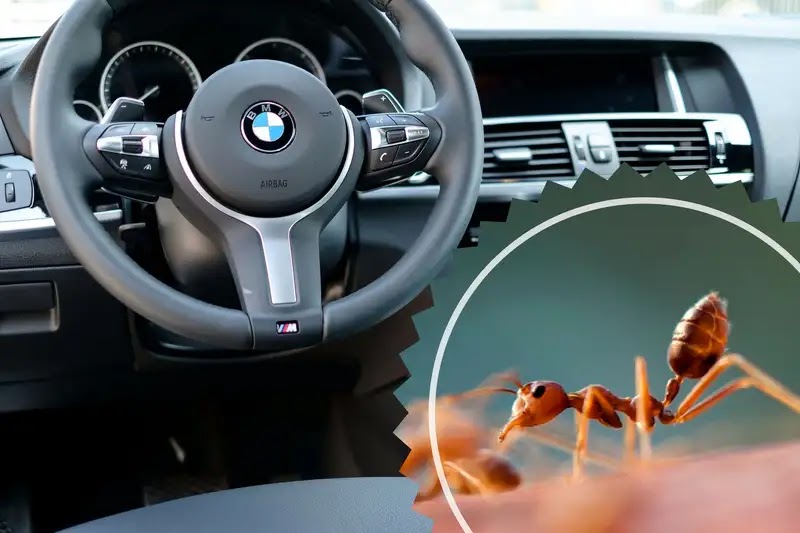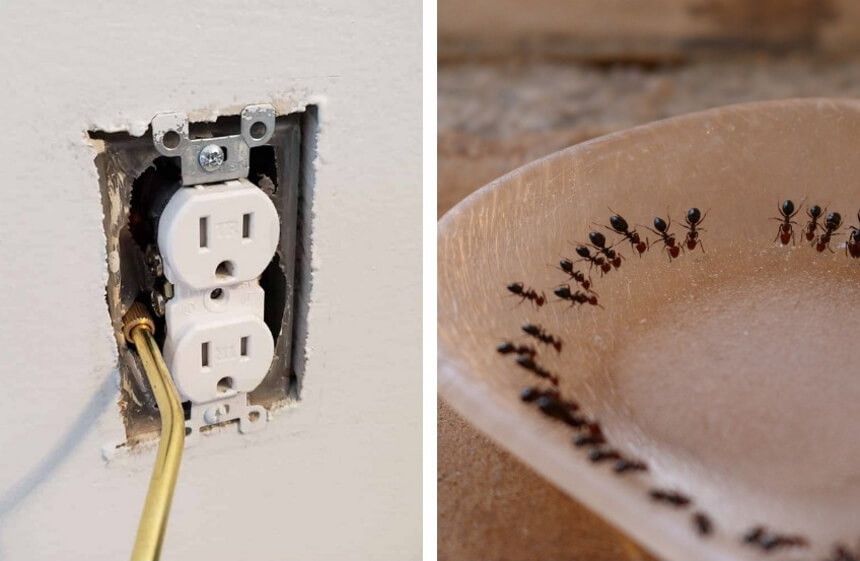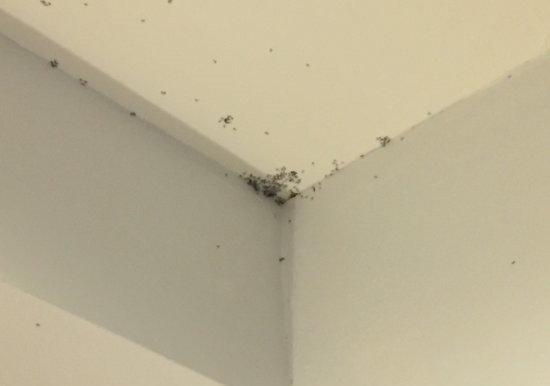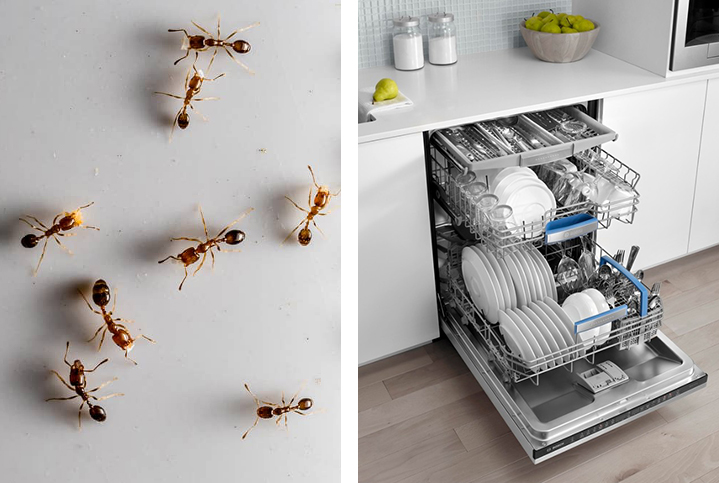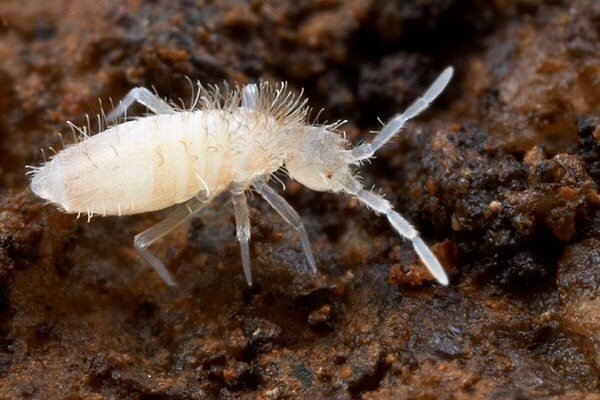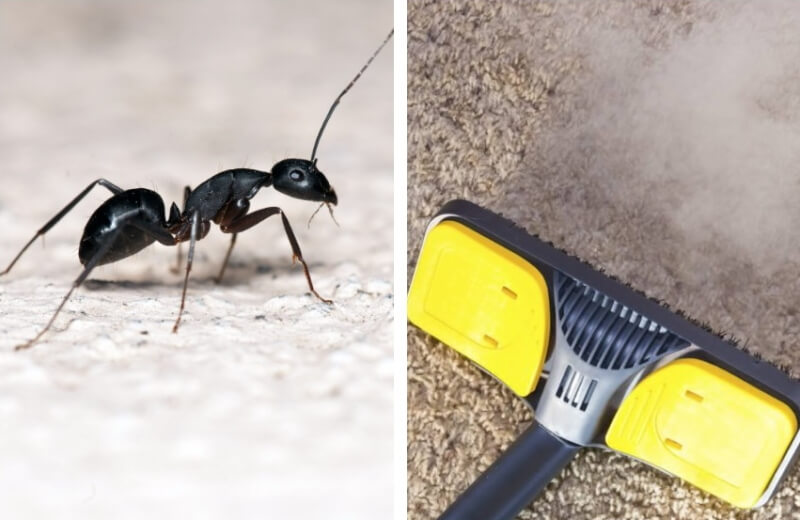

Ants are a common problem for homeowners. They can be annoying to deal with and can build up fast. Every creature needs food, water, and shelter, and ants are no different. This is why these tiny, bite-sized insects frequently invade our homes.
Even though these tiny creatures aren’t dangerous to human health or safety, they can frequently be an undesirable thing or, worse, eat through vital electric cables.
So although we try our best to keep our home tidy and clean, some of our efforts aren’t enough to keep the creatures at bay. At this point, we need to know how to get rid of ants thoroughly if we must enjoy the comfort of our homes.
Before you talk about getting rid of ants in your home, you should be able to recognize them from other insects. Due to their miniature nature, they can easily be mistaken for termites. We will look at some features that distinguish both of these annoying creatures.
Although termites and ants may appear identical to the casual observer, there are significant differences, including how to handle each.
Although most ants possess curved antennae and a narrow waist, termites have broad bodies and straight antennae. Call a qualified exterminator for an inspection and treatment if you think you have termites.
Only a small number of the over 10,000 ant species thought to exist regularly enter buildings. Here is a list of the most frequent home “destroyers” and the dangers they pose.
Carpenter ants can cause a lot of damage to a piece of property by eating damp, rotting furniture, even though they are not harmful to people. Carpenter ants only consume wood that has already been exposed to vulnerability and water damage, as opposed to termites, which can consume any available timber. To get rid of carpenter ants, keep an eye out for any leaks or areas of your house that are exposed to the elements.
Aside from damaging house furniture, these ants can also break the skin to bite, and although their stings are not poisonous, they can cause excruciating pain to the victim.
Due to their small size and profusion, these ants are challenging to eliminate once they have completely conquered a building. Since their stature enables them to invade sterile spaces and spread diseases, they can be a severe risk in medical settings or hospitals.
The name “crazy ant” refers to these ants’ irrational movements when searching for food. This species is tenacious and challenging to treat because it inhabits big colonies with numerous queens.
Odorous house ants are petite and black or dark brown, similar to crazy ants. They can be identified by the foul stench they release when crushed.
Despite their diminutive size, fire ants are notorious for their devastating sting. Fire ants sometimes try to invade homes when they need water or food, even though they generally live outside in their mounds.
Although everyone knows that fire ants can sting, it’s crucial to distinguish between a normal response and an adverse reaction. A fire ant bite typically causes itching, swollen red skin that subsides within a few hours. A variety of symptoms, such as dizziness, short breath, a swollen tongue, and stomach discomfort, can be signs of an allergic response.
These ants routinely engage in combat to maintain their dominion, and the aftermath of one of these bouts frequently includes many dead ants. Although aphid-produced honeydew is their preferred food, if it isn’t available, they may and do eat various human foods.
Although these little ants rarely attack people, they may do so if threatened. The most common treatment for pavement ant bites is cold compress or ice.
There are several ways to get rid of ants naturally and conventionally. We will consider several approaches in this section.
For some people, bait traps with encapsulated pesticides may be preferred to sprays. Ants are drawn to bait traps, which then capture them. The bait is consumed by the ants, who then take a portion of it to their nests, where it kills other ants.
Borax or boric acid is used in several bait traps. Some of these include hydramethylnon, which is toxic to humans, animals, and plants that grow food, including tomatoes.
Ant traps are available online, at many hardware stores, and in many other places. Checking the ingredients before purchasing is a smart idea to avoid toxins.
Peppermint can ward off mosquitoes, ants, or other pests. It is an effective natural bug repellent.
Carry out the following actions to use peppermint oil as an ant repellent:
A local grocery shop or health store may sell peppermint essential oil.
A form of silica known as “diatomaceous earth” is created from the fossilized remnants of aquatic animals termed diatoms (a kind of plankton).
Diatomaceous earth is not poisonous. It eliminates ants by draining the oils from their bones and drying them out. Diatomaceous earth is an irritant; therefore, you should not inhale it or rub it on the skin.
Online stores sell diatomaceous earth suitable for use in food. Follow the instructions on the packaging or apply the powder wherever you notice ants to kill them.
When they move, ants leave a fragrant pheromone trail that follows them and serves as a guide. This technique might eliminate the smell and keep the ants out of your house.
Here’s how to go about it:
Note: If you don’t have access to glass cleaner, you can probably eliminate the ant pheromone smell by using soapy water (such as hand soap or dish detergent).
Killers sprays are another effective and easy way to get rid of ants indoors. There are various sprays in the market and it can be really challenging to find a good one.
Hundreds of pests that invade homes, including ants, cockroaches, spiders, mosquitoes, wasps, lice, ticks, and more, are killed and repelled by Wondercide Indoor Pest Control Spray, a plant-based pest management spray that is fueled by natural oil.
Natural ant repellents include red (cyanne) or black pepper since the insects seem to dislike the fragrance.
To apply this technique, scatter pepper under appliances and along baseboards. According to anecdotal evidence, this is a safe technique to aid with ant prevention.
Tea tree oil has the potential to be a powerful ant repellent, much like peppermint essential oil. Follow these steps to apply this technique:
Note: If the aroma is too overpowering, try combining water, tea tree oil, and peppermint essential oil.
Keep tea tree oil away from pets, as you should with most essential oils.
You can buy tea tree oil online, at your neighborhood grocery store, or at a health food shop.
Calcium carbonate is a component of chalk. It can muddle an ant’s smell trail when spread out in a thick line, making it harder for the pests to detect the smell of other ants.
Draw a strong, heavy line with chalk around any objects you want to keep safe, like a barbecue or a picnic table.
D-limonene, an ingredient found in citrus fruits and, more specifically, in the rinds of oranges and lemons, is poisonous to ants. Keep those orange peels and use them to make a DIY ant repellant rather than throwing them away. This is how:
Although we’ve covered how to get rid of ants indoors, you might be asking how to eliminate ants from your yard without harming any plants. We recommend the following:
A fast technique to get rid of ants is to boil some water. Pour hot water onto the affected area if you notice ants coming out of a hole in the earth or a crack in the cement.
This will kill numerous ants within the area. Just be careful not to spray your crops or roots with hot water, as this will also harm them.
You can use exterior barrier sprays to cover your home’s foundation. These sprays offer both long-lasting prevention and contact killing of ants. You can get professional-grade pesticides from a pest management firm or buy them from your neighborhood home and yard store.
Some spray killers can be harmful to pets. You should be careful when shopping for spray killers if you have pets around. If you are not sure what to shop for, we’ve outlined some of the best pet-safe ant killers you can find on the market.
These function as dismantled bait sites. The granules are scattered around the exterior of your property, where ants ingest them and are dead in a matter of seconds. Experts have shown that Ant Shield Insect Killer Granules can be used outside your yard as a protective treatment to kill ants instantly (excluding pharaoh and harvester ants).
More than 65 different varieties of insects are controlled by this granule, including ants, cockroaches (American and German), silverfish, water bugs, and even crickets.
Who thought the key to eradicating ants in the home and yard could be found in your daily cup of tea?
Pest control specialists inform us that we can get rid of sugar ants using ground coffee. They advise using it outside or just before the door entrance.
Researchers tested the ghost ant, Pharaoh ant, and big-headed ant with three distinct coffee kinds. They discovered that all three species were very susceptible to Arabian coffee. So, to achieve the best results, purchase and spread a sack of this.
Employing an exterminator could be helpful if everything else fails. Choose a person who is dedicated to utilizing the fewest hazardous products possible. Inform them if you have young children, animals, or other worries, like a respiratory illness.
Several exterminators claim to be eco-friendly, organic, or green in their titles. Before hiring an exterminator, if you are worried about chemicals, ask them what they usually use to treat ants.
Ant infestations are a serious concern for experts. Here are some actions an exterminator team might perform in your home to get rid of ants:
Examination
The initial step is to inspect your property thoroughly. In this phase, they will identify the types of ants in your home, their origin, and the best strategy for eliminating them. Additionally, they will find and remove any possible food sources.
Monitoring
The colony is usually considerably larger than you think, even if you only notice a few ants in your house or yard. To be sure they are aware of the location of the main colony and the origin of the ants, they will keep an eye on their behavior. The ants will be tracked to the nest, entry points in the building will be found, and all existing hives or nests will be identified to ensure complete ant eradication.
Control
Ultimately, they meticulously plant baits like the Terro liquid baits that the ants will eat and return to the hive. They may occasionally spray the ant trail leading back to the colony in targeted areas. The objective is to eradicate all ants completely and permanently by eliminating the queen and her progeny.
Preventing ant infestations from the onset is the best method to handle them. These easy strategies will aid in preventing ants from getting into your home.
Evidently, the best way to get rid of carpenter ants is to have a professional exterminator come and spray your home. If you think you can deal with them on your own, then we recommend to use one the best carpenter ant killers which have proved effective in battle against this type of ants. Or you can try some do-it-yourself methods, like using boric acid or setting up ant traps.
There are a few things you can do to get rid of fire ants. You can use baits, traps, or chemicals to kill them. Here’s the list of the best fire ant killers you might want try.
You can also try to drown them out by flooding their nest. Whichever method you choose, make sure you are thorough and patient, as it may take a while to get rid of all the fire ants.
While eliminating an ant colony can occasionally appear to be an endless cycle, acting and implementing preventative precautions is much simpler than you might imagine.
Ants can enter your house through tiny cracks in the foundation or even broken plumbing to scavenge for food and water they need to live through summer. Hence, you must learn how to get rid of ants.
No matter the eradication method you employ, your best hope for getting rid of the little insects will be to ensure your home is tightly sealed, clear of open water and food outlets, and that your garden is clear of anthills.
